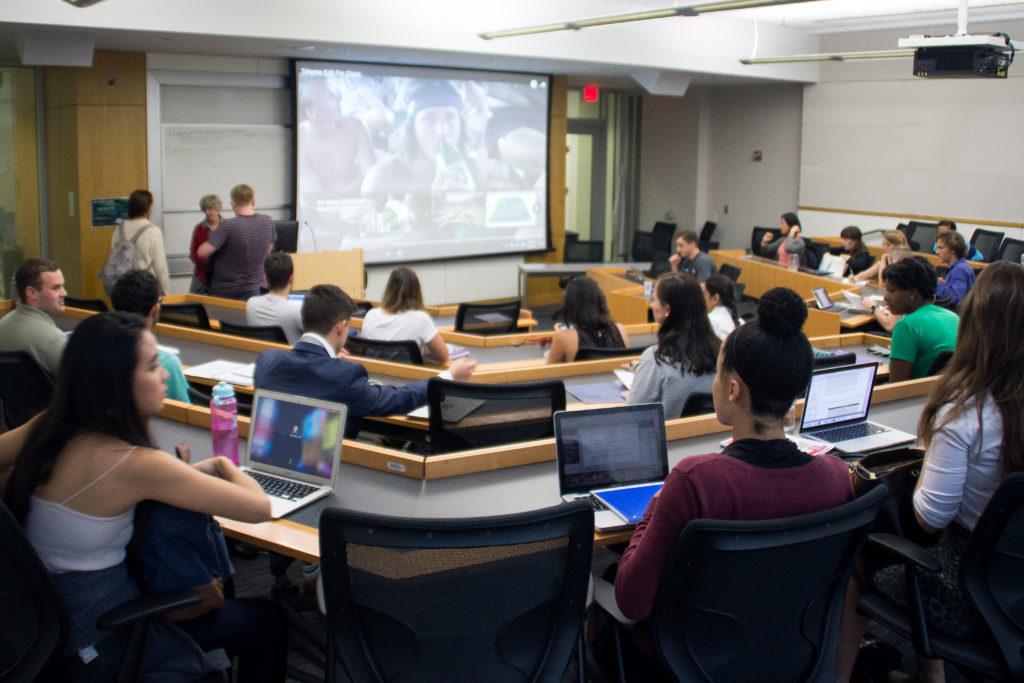Undergraduates in most schools will now be able to drop out of a course up until the last day of the semester.
Officials announced a change in the course withdrawal policy last month in an email sent to undergraduates in the Columbian College of Arts and Sciences, Elliott School of International Affairs, School of Engineering and Applied Sciences, Milken Institute School of Public Health and the School of Business. Officials said the policy, which is already in effect this semester, was based on student input and designed to decrease the number of administrative hurdles students face when they want to withdraw.
Previously, students were only allowed to withdraw before the 10th week of classes in a semester through Banweb, according to the Office of the Registrar. Past the 10th week, students had to petition to drop a course and provide substantial supporting documentation – like a doctor’s note or proof of a medical diagnosis – to an academic adviser explaining their reasoning.
“It possibly could have real implications for some students who are right on the boundary of full-time.”
University spokeswoman Maralee Csellar said the new policy – determined by the five undergraduate deans and the Office of the Provost – is designed to simplify the withdrawal experience for students after complaints that the process was “difficult and confusing.” Academic advisers were often flooded with late withdrawal requests from students wanting to drop a course late in the semester and the new policy will free up advisers’ time to focus on directly aiding students, she said.
“Creating flexibility for students, without requiring them to jump through additional administrative hurdles, should enhance the student experience and enable our undergraduate advising offices to focus on helping students navigate their curriculum,” Csellar said in an email.
Undergraduates in the five schools enacting the new policy still have to submit a form documenting their withdrawal if they decide to drop out after the 10th week of the semester. Graduate students and undergraduates in the nursing and medical schools as well as the College of Professional Studies still can’t drop a course after the 10th week of the semester, according to University guidelines.
Csellar said the policy will be adjusted if issues arise.
Philip Wirtz, a professor of decision science and psychology and chair of the Faculty Senate’s educational policy committee, said his committee would review the new policy “in the coming month.” He declined to weigh in on the new guidelines until the review is complete.
“I am reserving my judgement,” he said. “I am told that the undergraduate deans view it as important, but it has not yet been vetted by the senate education policy committee, so the various pros and cons have not yet been presented to or weighed by the faculty.”
Student Association President Peak Sen Chua said the SA was involved in giving administrators feedback at the beginning of the semester on changing the course withdrawal policy and how it can help students – especially those spiraling toward a low grade.
“We think that this new policy will benefit students who face an unexpected crisis or wish to re-evaluate their priorities and academics towards the end of the semester,” he said.
The SA has sought feedback on academic advising this semester, hoping to address long-standing concerns about scheduling sessions and prolonged wait times for assistance.
Chua added that students should still be mindful of the possible implications of having a “W” for withdrawal on their transcript. If a student completes less than 12 credits in a semester, they could lose full-time status – putting qualifications for veteran benefits, financial aid eligibility, international student visas, athletic eligibility and housing in jeopardy.
Murray Loew, a biomedical engineering professor, said he supports the policy because it allows students to feel less urgency about dropping a course and take the time to see if withdrawing is the right move. Students still need to pay attention to the consequences of not completing enough classes, he added.
“I think basically it’s fine,” he said. “It possibly could have real implications for some students who are right on the boundary of full-time.”
“Students who are really struggling with personal issues, really struggling with health issues, sometimes an incomplete is the right route for students like that.”
Tyler Anbinder, a professor of history, said if he was a student and found himself doing poorly in a course, he would use the new guidelines to drop out. But he said students dropping out after nearly a semester of coursework could create issues.
“I hate the idea of students dropping courses so late, but I guess if I was a student and had a bad grade, I’d like to be able to drop it late,” he said.
Monique Turner, an associate professor and assistant dean of public health programs, said there will likely not be much of a change in the number of withdrawals overall because students who pay for a course will still want to stick around to ensure they receive full credit.
“Most students want to complete their classes and they want to complete them on time,” she said. “They don’t want to drop them and have to completely pay for them again.”
Turner said this policy will primarily help students with unexpected personal or health issues that impede their ability to succeed in courses.
“Students who are really struggling with personal issues, really struggling with health issues, sometimes an incomplete is the right route for students like that,” she said.





